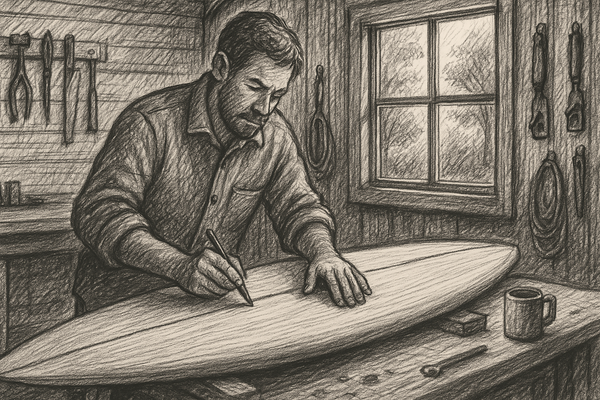Why I’m more interested in excited founders than exited ones.

Every week I see the same headline appear on LinkedIn: Exited Founder.
It has become a modern badge of achievement. The post is usually paired with a photo, a reflection on the journey, and a stream of congratulations. And rightly so. Selling a business takes vision, risk, and perseverance. It can be an incredible milestone.
What I keep thinking about, though, isn’t the sale itself. It’s the label.
Why has “Exited Founder” become such a defining marker of success? Why is it that we celebrate the end of the story more than the middle of it?
I’ve been involved in acquiring businesses and working with some incredible founders who have decided to sell. I understand how hard it is to build something from scratch, and I have a deep respect for anyone who gets to that point. What I find interesting is how much weight we now attach to the title itself. It has almost become a brand in its own right.
The rise of the label
Somewhere along the line, entrepreneurship started to look like a race. The storyline became predictable: build fast, grow faster, sell, and move on.
The challenge with this narrative is that it often flattens everything in between. The years of learning, building culture, and shaping something meaningful can disappear in favour of a single moment of transaction.
The point isn’t to question the validity of selling a business. It’s to ask why the label has become the thing we celebrate most. Because when we focus on the 'exit', we risk overlooking the many founders who are still 'excited' - still building, and still deeply engaged with their work.
The founders who stay excited
There are plenty of people who stay the course, but they rarely describe themselves with any labels at all. They’re not defined by what they’ve done, but by what they’re still doing.
These founders still get a buzz from solving problems, creating products, and leading people. Their motivation isn’t valuation. It’s meaning. They’re driven by curiosity, not completion.
One example is John O’Nolan, founder of Ghost. Ghost is a publishing platform run by a non-profit foundation, built to exist for the long term. John has said that he never wanted to create something to sell, but something that could sustain itself.
Another is Jason Fried, co-founder of Basecamp and HEY. Jason has been running the same company for over two decades, quietly shaping a business that prioritises calm, independence, and craftsmanship.
And Tom Bihn, who still designs and makes his own backpacks in Seattle, is another great example. He’s been doing it for more than forty years and has always resisted the idea of selling or scaling beyond what feels right. He once said that the ability to stay small and independent is what makes him happiest.
Each of these founders has built a business that reflects who they are, not what the market expects them to be. They prove that excitement can last longer than hype.
The other side of success
Exits can be positive and often create opportunities for growth, reinvention, or rest. They can give founders the space to start again or support others in doing so. I’ve seen the value and freedom they can create.
But what gets lost is the way we’ve made “Exited Founder” sound like the only possible destination. It can make success look like a straight line when, in reality, it’s a cycle. The act of building, adapting, and staying curious can be just as rewarding as the moment of selling.
The best founders I know don’t see success as an event. They see it as a series of ongoing choices that include growth, reinvention, and balance.
The quiet moments after
Founders who have sold often describe an odd sense of silence afterwards. The structure that once shaped their life suddenly disappears. The pressure might lift, but so does the rhythm. The days stretch out, and it takes time to rediscover purpose.
That doesn’t mean selling was wrong, but it shows that exits are never just financial. They’re emotional too. What matters is how you move forward, what you do next, and whether you still feel energised by what you’re creating.
Why we need more stories of staying
Our culture loves stories with endings. It’s why exits trend. They’re easy to explain and look great in headlines. But the reality is that most of a founder’s life happens after the big moments.
I’d like to see more recognition for the people who have quietly been doing great work for ten or twenty years. The founders who reinvent, refine, and rebuild. The ones who continue to care about their craft.
Success can take many forms. For some, it’s an exit. For others, it’s the satisfaction of doing something you believe in every day. Both are valid. But the second group rarely gets the spotlight.
Redefining ambition
Ambition has been mis-sold as speed. We equate momentum with meaning. The faster you move, the more successful you must be.
But ambition can also be slow. It can be measured in quality, relationships, and depth. It can mean creating a business that feels good to run and continues to make a difference long after the novelty fades.
Some of the most resilient founders I’ve met don’t chase size or status. They’re more interested in alignment - in building something that reflects what they value. That kind of ambition lasts.
Building for the long term
When you stop designing your business around an exit, everything changes. You start to care more about the experience of working in it, the people you bring along, and the kind of culture you’re shaping.
You think longer term. You focus on sustainability, both financial and emotional. You want to build something you’re proud of, not just something that looks good from a distance.
This approach isn’t slow or safe. It’s deliberate. It’s about building something that’s still exciting ten years later.
The question worth asking
I often think about this: if you knew you could never sell your business, how would you run it?
Would you make the same decisions? Would you hire differently? Would you spend more time nurturing people or refining what you offer?
That question helps strip away the noise. It reminds you to focus on the parts of the business that bring real satisfaction. It puts the emphasis back on craft, purpose, and longevity.
Beyond the label
“Exited Founder” should stay as a term. It represents hard work, timing, and courage. But it doesn’t need to be the headline for every success story.
We need to make more room for the founders who are still excited; the ones who are continuing to build, adapt, and learn. The ones who still feel a sense of energy about the future.
Because staying curious, staying motivated, and staying true to your values are achievements in their own right.
A broader definition of success
Success doesn’t have to mean walking away. It can mean creating something that gives you purpose and freedom while you’re still in it. It can mean shaping a company that grows with you and reflects what you stand for.
I’ve met founders who sold and found clarity. I’ve met others who stayed and found peace. Both paths are valid. What matters is not the label, but the feeling behind it.
The goal isn’t to be an exited founder. It’s to be an excited one.
Because the most inspiring people I meet aren’t the ones who have finished building. They’re the ones who can’t wait to see what happens next.






